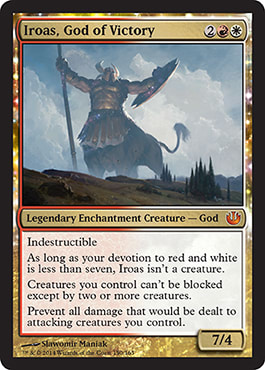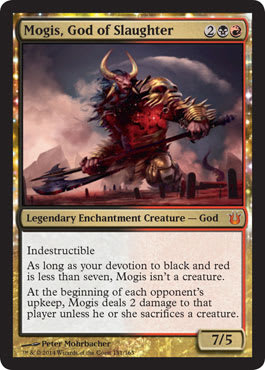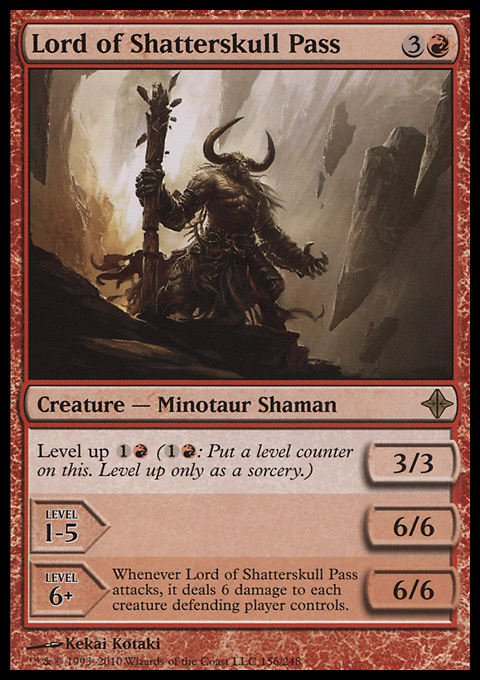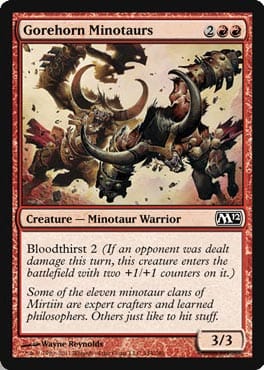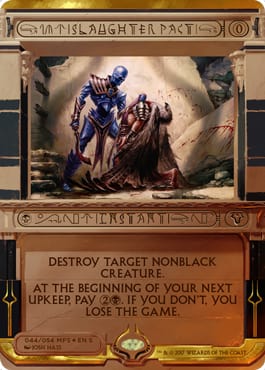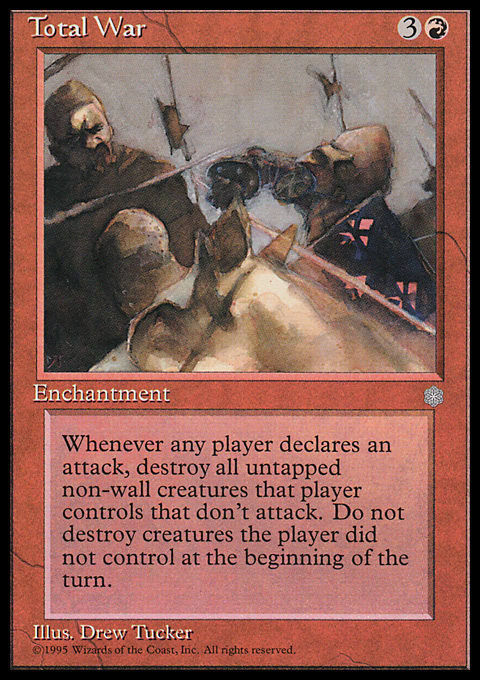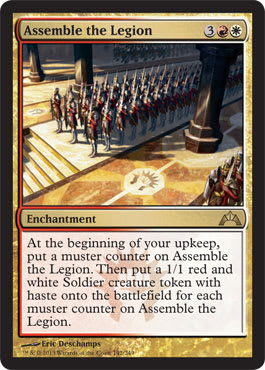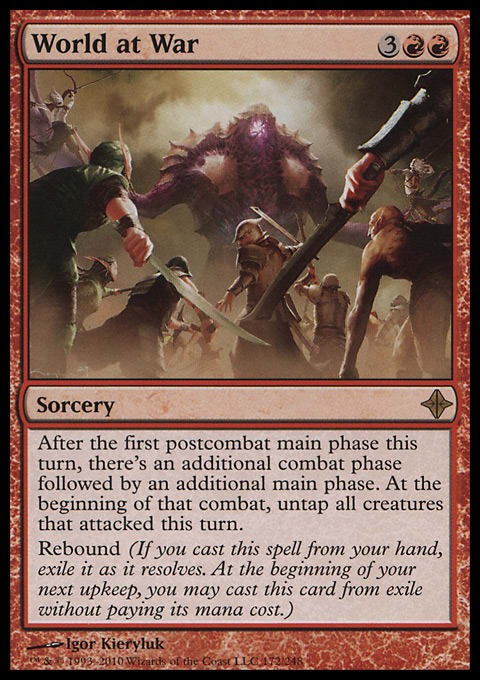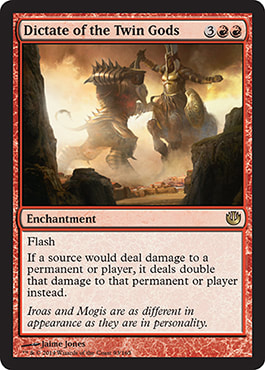
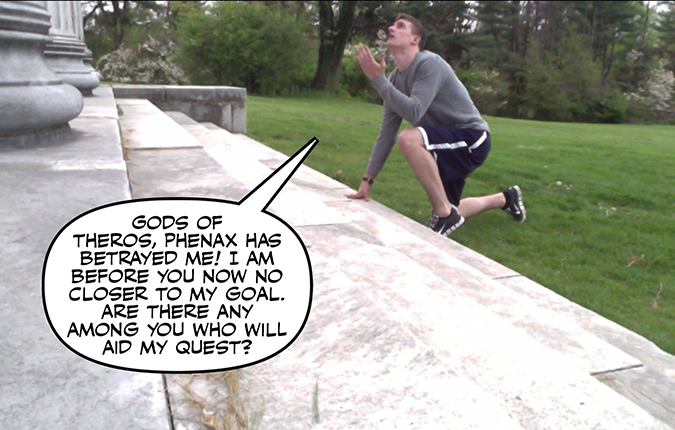
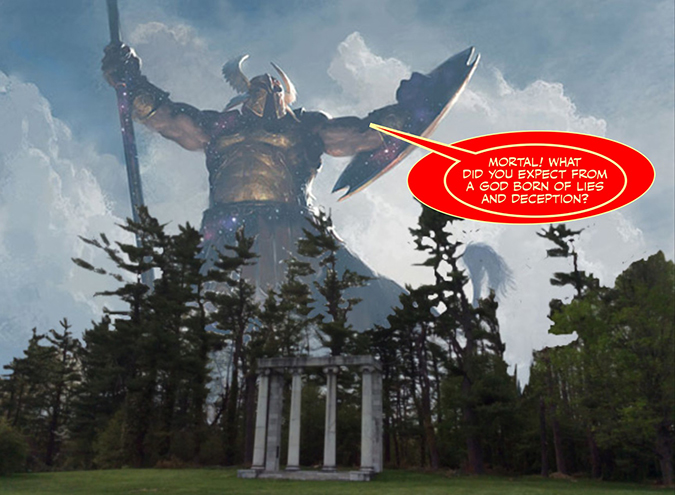
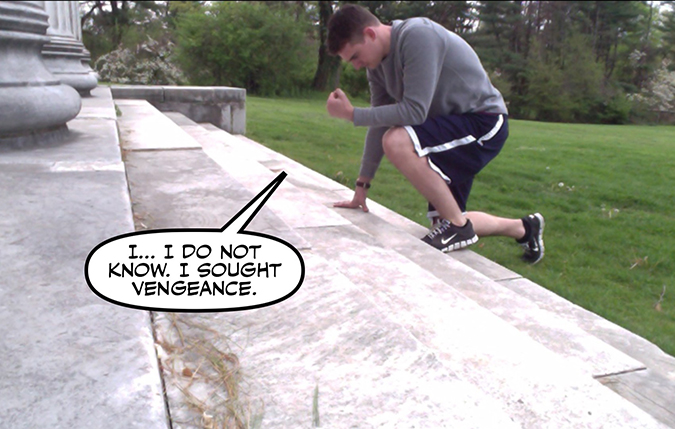
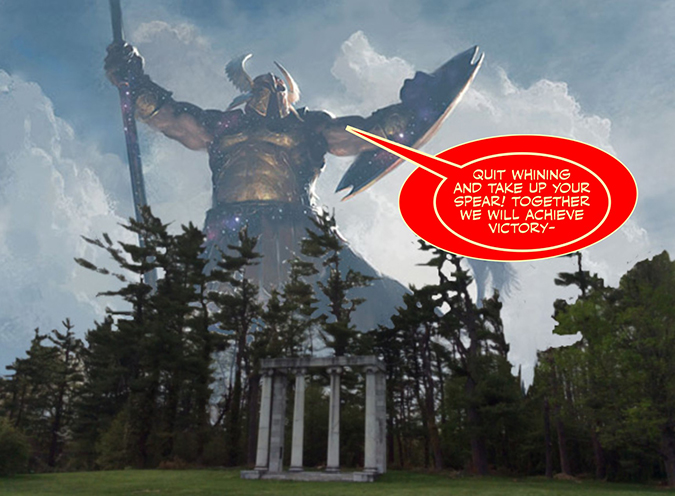
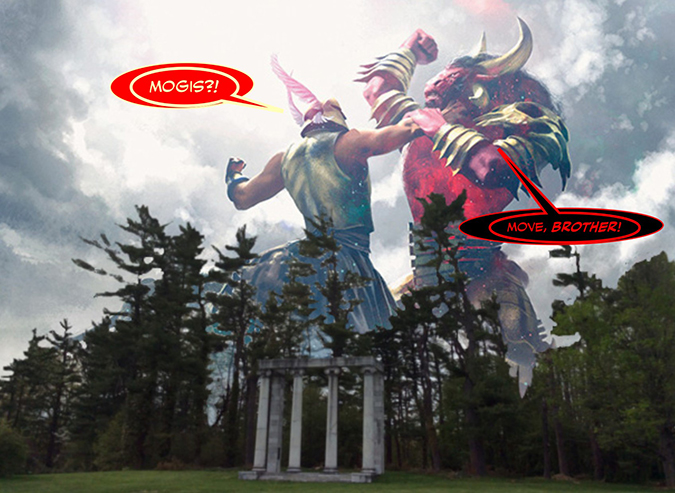
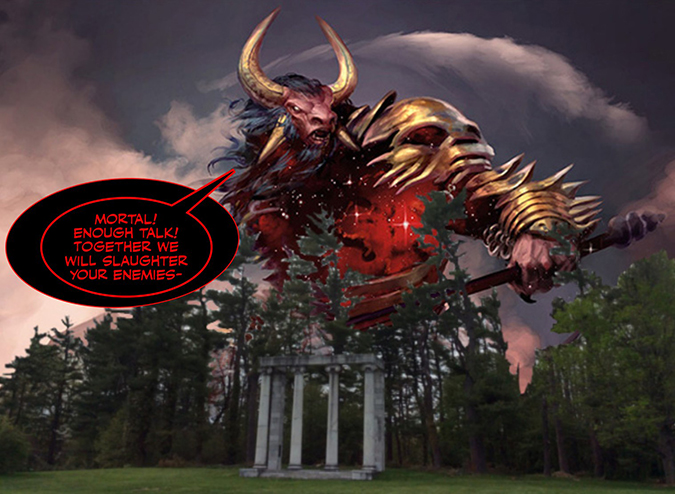
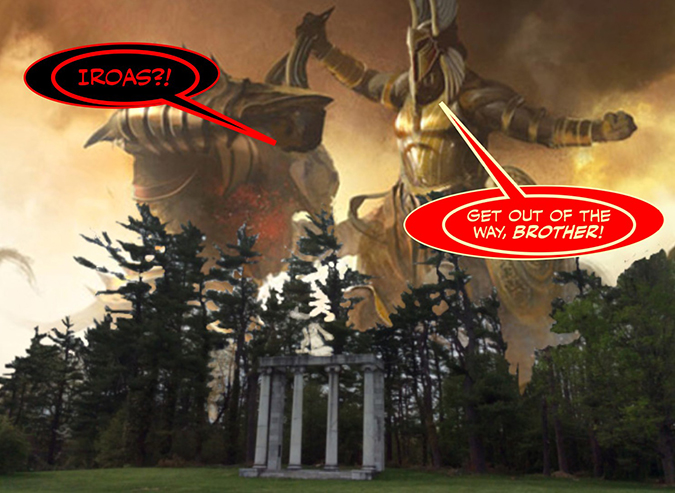
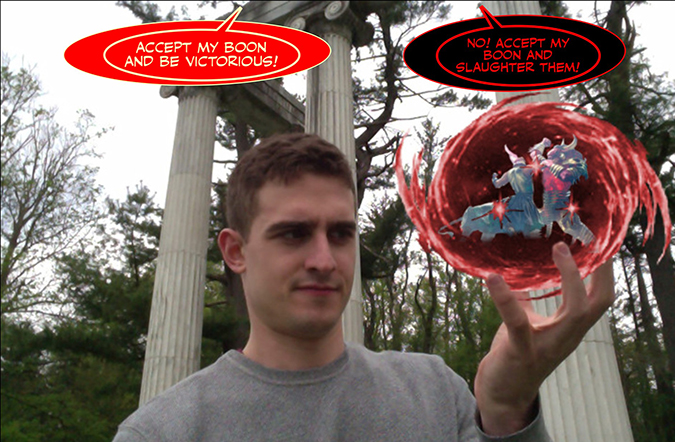
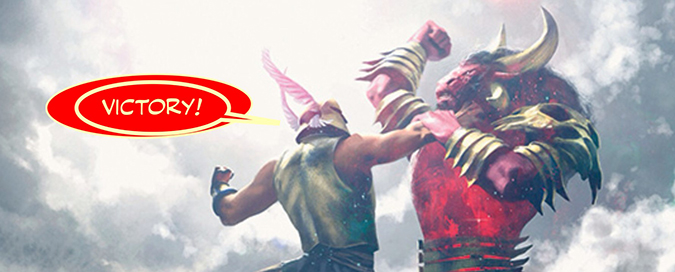
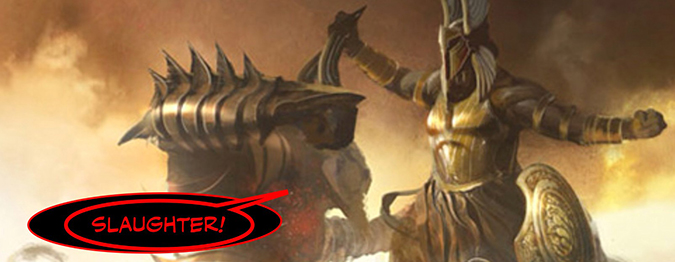
In this article, I outline a different and creative way to create a Commander deck based in Theros flavor. If you are looking for an article containing a standard Commander deck, this article is not for you. If you are looking for a creative twist on Commander that will allow you to pilot the Twin Gods of war against your playgroup, this article is for you.
Brothers in Arms
When the gods of Theros were first being revealed to us, I immediately fell in love with the concept of the warring Twin Gods. Who better to represent the domain of war than twin siblings who were constantly at each other’s throats? As I tried to imagine what the personality of each of these characters was like, I fell on this idea that their relationship was similar to two young boys who constantly fight over their toys. I could picture the Twin Gods, yelling back and forth as each attempted to claim the same oracle for himself.
“Hey! That oracle is mine—get your own!”
“No it isn’t! Its mine! It’s my turn to have an oracle!”
“No, Kruphix got that oracle for me!”
The twin gods would complain as they fought. I would laugh to myself, picturing the result of such sibling rivalry as the two brothers began wrestling each other (and most likely accidently breaking the oracle in the process).
I bet the two gods of war would fight over everything, I thought. I bet they would even fight over who would get to be my commander.
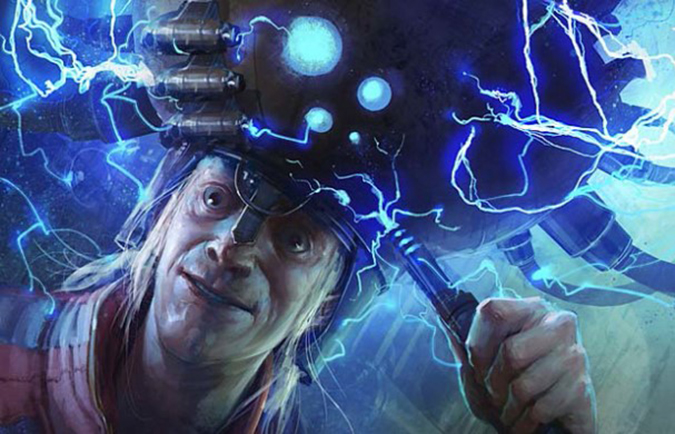
Inspiration, like lightning, can strike you from nowhere. When it does, your brain can feel as though it is supercharged, your synapses firing off at an exceptionally rapid rate.
What if the two gods did fight over who would be your commander, and what if they did this while you played a game of Commander? What if the two fighting twins combined represented your deck’s commander? What would that mean? How would that play?
These were just a few of the questions flowing through my mind as I sat down to tackle this interesting idea. One of the greatest facets of Magic is that it is many games. When you decide to sit down and start slinging your spells against an opponent, you are only limited by your own creativity. Before there was a Commander format, someone had the idea of a deck led by a powerful general. Before there was a Cube, someone had the idea of a set card list meant to be drafted again and again. Never be afraid to think outside of the box, and make Magic what you want it to be.
So, I found myself with an interesting question to answer:
How do you build a deck that creates a play style in which it feels as though the Twin Gods of war are fighting each other to be my commander?
I sat down and began to construct the ground rules for a deck with two commanders. Normally, a Commander deck (as you all know) is a hundred-card singleton deck featuring one commander that sets the color identity for the deck. I settled on the idea that, instead, in order to create my hundred-card deck, I would craft two fifty-card singleton decks, one commanded by Mogis and one commanded by Iroas, and I would shuffle these two fifty-card decks together to form a single hundred-card deck.
And yes, each deck needed to fit the flavor of the god commanding it. I am a Vorthos after all.
Commanding the Slaughter
Mogis Decklist ? Commander Variant | Ant Tessitore
- Commander (0)
- Creatures (19)
- 1 Anaba Spirit Crafter
- 1 Avatar of Slaughter
- 1 Cyclops of Eternal Fury
- 1 Fanatic of Mogis
- 1 Felhide Petrifier
- 1 Felhide Spiritbinder
- 1 Furystoke Giant
- 1 Gnarled Scarhide
- 1 Gorehorn Minotaurs
- 1 Karplusan Minotaur
- 1 Kragma Warcaller
- 1 Lord of Shatterskull Pass
- 1 Minotaur Warrior
- 1 Mogis's Marauder
- 1 Mogis's Warhound
- 1 Rageblood Shaman
- 1 Wrecking Ogre
- 1 Kazuul, Tyrant of the Cliffs
- 1 Tahngarth, Talruum Hero
- Spells (10)
- 1 Blind Fury
- 1 Slaughter
- 1 Slaughter Pact
- 1 Fury of the Horde
- 1 Spite of Mogis
- 1 Spoils of War
- 1 Curse of Bloodletting
- 1 Gratuitous Violence
- 1 Rage Reflection
- 1 Total War
- Lands (20)
- 10 Mountain
- 7 Swamp
- 1 Mana Confluence
- 1 Temple of Malice
- 1 Nykthos, Shrine to Nyx
First up, we have Mogis, God of Slaughter.
With Mogis by your side, you will summon hoards of cattle . . .
. . . you will slaughter your enemies . . .
. . . and you will know the spoils of war.
Commanding Victory
Iroas Decklist ? Commander Variant | Ant Tessitore
- Commander (0)
- Creatures (18)
- 1 Akroan Hoplite
- 1 Akroan Line Breaker
- 1 Archetype of Aggression
- 1 Archetype of Courage
- 1 Boldwyr Intimidator
- 1 Cyclops Gladiator
- 1 God-Favored General
- 1 Nobilis of War
- 1 Ogre Battledriver
- 1 Sandstone Warrior
- 1 Sightless Brawler
- 1 Varchild's War-Riders
- 1 Vengeful Firebrand
- 1 War Elemental
- 1 Zealous Conscripts
- 1 Agrus Kos, Wojek Veteran
- 1 Brion Stoutarm
- 1 Jeska, Warrior Adept
- Spells (11)
- 1 Master Warcraft
- 1 Launch the Fleet
- 1 Waves of Aggression
- 1 World at War
- 1 Assemble the Legion
- 1 Crescendo of War
- 1 Emblem of the Warmind
- 1 Glory of Warfare
- 1 In the Web of War
- 1 Armory of Iroas
- 1 Coat of Arms
- Lands (20)
- 7 Plains
- 9 Mountain
- 1 Arena
- 1 Contested War Zone
- 1 Grand Coliseum
- 1 Temple of Triumph
Second, we have Iroas, God of Victory.
With Iroas by your side, you will summon a legion of warriors . . .
. . . you will inspire your army . . .
. . . and you will lead them into war until you are victorious.
Commanding the Twin Gods
Taking these two fifty-card lists, I shuffled them together into a single W/B/R, hundred-card singleton deck. In order to have this deck function as any other Commander deck would, I came up with the following additional rules when using the deck:
- At the beginning of the game, I have two commanders (Mogis and Iroas) in the command zone instead of one.
- My deck’s color identity is W/B/R.
- I can play either Iroas or Mogis any time I could play a commander.
- My commanders share the Commander casting-cost rule. For example, if I were to cast Iroas on turn four, it would cost me


 . If I were to then cast Mogis on turn six, it would cost me
. If I were to then cast Mogis on turn six, it would cost me 

 because I had already cast my commander once that game.
because I had already cast my commander once that game. - If Iroas is on the battlefield, and I cast a spell that would not align with his color identity (a.k.a. a black spell), I must sacrifice Iroas. (The flavor here is that he does not approve and thus leaves.)
- If Mogis is on the battlefield, and I cast a spell that would not align with his color identity (a.k.a. a white spell), I must sacrifice Iroas. (These two rules also prevent the brothers from being in play at the same time.)
I set these rules up to ensure that I did not gain any kind of serious advantage over my opponents by having two commanders, and it would also to tie into the flavor of the gods and how they are fighting over being my commander. I could not, however, resist the urge to have some sort of opportunity where I could have both Gods on the battlefield at the same time. I quickly realized that, due to the fact that my deck had two commanders, I would be playing from a list of ninety-eight cards instead of the normal ninety-nine. Looking through the red cards of Theros block, I realized that I had left out a crucial card when constructing my two lists:
That was when it hit me. Dictate of the Twin Gods is the perfect ninety-ninth card for this deck, and it fits right in between the two Gods. What if this card enabled me to control both Gods? I came up with a few additional rules for using this deck:
- If I control Dictate of the Twin Gods, and I control Iroas or Mogis, I can summon the other God and not be forced to sacrifice the first. However, both Gods become tapped and must remain tapped as long as his brother is in play. (This is to play up the flavor in that they are locked in battle with each other, too distracted to help me do anything else.)
- If I ever control both Gods and no longer control Dictate of the Twin Gods, I must sacrifice both Gods.
- If both Gods are on the battlefield (and thus are tapped and fighting each other), I am free to cast any card in my deck and not worry about the above rules that cause me to sacrifice a God. (The flavor here is that the two Gods are so busy fighting each other that they don't realize what I am busy doing.)
After a couple playtests against some of my other decks, I decided to take the deck to my local playgroup and see what they would think about the strange setup and additional rules. At first, they were skeptical, and they voiced concerns that I would have an advantage being guaranteed both cards at the start of the game, but once I explained the additional limitations I would be putting on myself, they came around to the idea and were willing to let me try it out.
The deck ended up being a huge hit, not only because it created some interesting play situations for me, but because the rest of my group really started getting into the flavor of what my deck was representing. The best part? We started discussing the flavor of Theros while we played, contemplating the origins of the gods and what was behind their existence. Some of the group members even started brainstorming creative deck ideas of their own, which we would all discuss.
Embracing Your Creativity
I hope you enjoyed this different approach to deck-building, and I hope that it inspires you to be creative and think outside the box when you are crafting your decks. Magic is a beautiful game in that it is what you want it to be. Your only limit is your own imagination. Who knows, the next great casual Magic format (like Commander) could come from you!
















